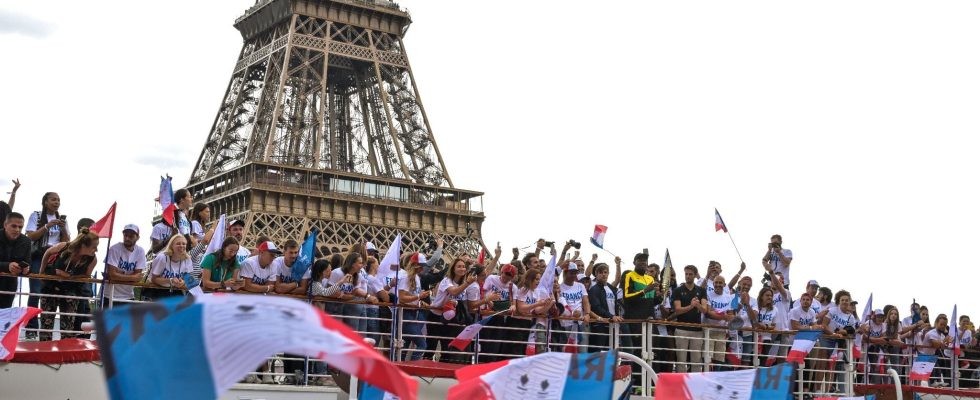Last February, a confidence from an Elysée advisor to L’Express on Emmanuel Macron and Paris 2024: “He wants to make these Games a unifying moment, an antidote against archipelagoization”. Damn! A monumental and so necessary ambition, what can we do with these sixteen days as an opportunity to repair French society, to bring these scattered pieces of country together for good? “At the top of the pile, we urgently need to rethink the political and social ties that weave the country together. Recreate the conditions to create a nation, in the sense that Ernest Renan understood it, by reconnecting with ‘the desire to continue living together ‘”, we wrote on April 26, 2022, facing the re-election of the one we named “the last chance president”, before the populist temptation.
A hundred days before the Olympic Games, how can we not adhere to this desire to mend France, in a country where daily controversies, sometimes healthy, artificially magnified to the point of caricature more often than not, show the extent of political fractures? , economic, identity? The excellent series Fever skillfully reflects the neuroses that have captured public debate for so many years, and our collective inability to escape this fascination with the most virulent passions. Unfortunately, things rarely happen as the President of the Republic hopes. There is no example of a country repaired by the grace of sixty Olympic medals. We must therefore be extremely realistic about what the Olympics can and cannot produce.
Tourism, diplomacy, emotion
The Olympic Games can do a lot. If the opening ceremony is held on the Seine, if it is successful, if the authorities manage to ensure the security of the event, France will benefit. We will give the image of a modern, daring country, a country that knows how to succeed. Diplomacy will benefit from it, tourism will benefit from it, a small increase in growth can also be expected from 2024, according to the Astérès firm, which estimates the added value linked to the organization of the Olympic Games at 0.4% of GDP. If the event also makes it possible to sustainably anchor the practice of sport among French youth, this should still be welcomed.
On a personal level, Emmanuel Macron, Anne Hidalgo and Gérald Darmanin will benefit from it, all at their level. The Head of State, in particular, will be able to claim a success consistent with the memory he would like to leave of his political mandate, that of a leader full of courage and consistency in ideas, turned towards the future.
Fertile trauma
Our national pride will be flattered. Sport has the power to generate surges of patriotism – of chauvinism, detractors will say – which have long since disappeared from countries at peace. Subject to a few exploits, we will end the summer in a sweet euphoria, thinking both of the sporting heroes and of the tour de force that was the organization of such an event. The magnificent losers will give us imperishable emotions, these fertile traumas that artists sublimate in works, we must read Seville 82by Pierre-Louis Basse or A spring 76, by Vincent Duluc, novel about the unfortunate European epic of AS Saint-Etienne. “Saint-Étienne had the Greens, the city had this fever, a country came to take its pulse, and before its eyes the working class was dying, singing ‘Who are the strongest?'”, writes Duluc, editorialist at The Team. Sport and politics intertwined, there too.
But sport can’t do everything. Major competitions have never had a lasting influence on the state of mind of a population, nor have they curbed radical impulses. The “black-white-beur” epiphany post-1998 World Cup did not prevent Jean-Marie Le Pen’s accession to the second round of the presidential election, on April 21, 2002.
Olympics then Brexit
Two recent examples show the extent to which the Olympic Games do not necessarily play this fantasized role as a “reconciling moment” for the nation. London 2012 was an undeniable event and sporting success, with 65 British medals. Four years later, English society was torn apart, a Labor MP, Jo Cox, was shot dead by a far-right activist and, on June 26, 2016, the British people voted for Brexit by 51.89%. The only common thread, the political star of the Olympics, the then mayor of London, Boris Johnson, will become the star of the “Brexiters” camp. In Brazil either, the Rio Olympics in 2016 did not stitch together an increasingly fragmented society, fractured by repeated corruption scandals. On October 28, 2018, Jair Bolsonaro, the far-right candidate, was elected president of Brazil.
Conversely, we remember to what extent the Seoul competition in 1988 accompanied the democratic and economic renewal of South Korea. In the same way, Beijing 2008 punctuated China’s entry into the ranks of the great diplomatic powers. But each time, the Olympic Games complete and symbolize a phenomenon which exists independently, they do not create it.
Notice to the French presidency: it seems that sport has many virtues, but not the power to significantly influence deep crises. “He intends to make these Games the summer we remember,” described more modestly, in February, another advisor to the Elysée. Giving enthusiasts a memorable summer: a more humble ambition, but no less important for those who claim to “change the lives” of their fellow citizens, or at least give them, for a fortnight, an extra dose of intense pleasure.
.
